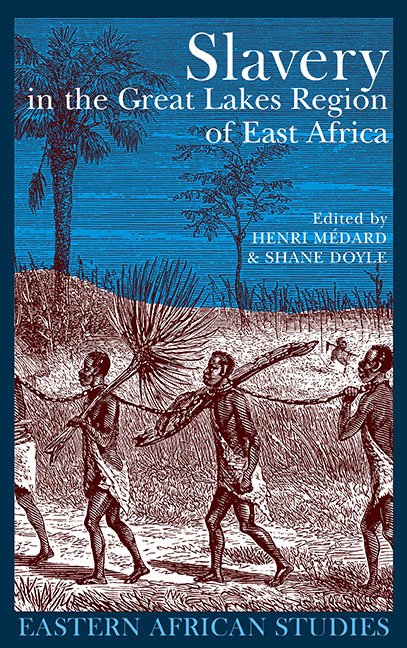Book contents
- Frontmatter
- Dedication
- Contents
- List of Maps & Tables
- Notes on Contributors
- Introduction
- 1 Violence, Marginality, Scorn & Honour: Language evidence of slavery to the eighteenth century
- 2 Notes on the Rise of Slavery & Social Change in Unyamwezi c. 1860 –1900
- 3 Slavery & Forced Labour in the Eastern Congo 1850 –1910
- 4 Legacies of Slavery in North West Uganda: The story of the ‘One-Elevens’
- 5 Human Booty in Buganda: Some observations on the seizure of people in war c.1700 –1890
- 6 Stolen People & Autonomous Chiefs in Nineteenth-Century Buganda: The social consequences of non-free followers
- 7 Women's Experiences of Enslavement & Slavery in Late Nineteenth- & Early Twentieth-Century Uganda
- 8 Slavery & Other Forms of Social Oppression in Ankole 1890 –1940
- 9 The Slave Trade in Burundi & Rwanda at the Beginning of German Colonisation 1890 –1906
- 10 Bunyoro & the Demography of Slavery Debate: Fertility, kinship & assimilation
- References
- Index
9 - The Slave Trade in Burundi & Rwanda at the Beginning of German Colonisation 1890 –1906
Published online by Cambridge University Press: 11 August 2017
- Frontmatter
- Dedication
- Contents
- List of Maps & Tables
- Notes on Contributors
- Introduction
- 1 Violence, Marginality, Scorn & Honour: Language evidence of slavery to the eighteenth century
- 2 Notes on the Rise of Slavery & Social Change in Unyamwezi c. 1860 –1900
- 3 Slavery & Forced Labour in the Eastern Congo 1850 –1910
- 4 Legacies of Slavery in North West Uganda: The story of the ‘One-Elevens’
- 5 Human Booty in Buganda: Some observations on the seizure of people in war c.1700 –1890
- 6 Stolen People & Autonomous Chiefs in Nineteenth-Century Buganda: The social consequences of non-free followers
- 7 Women's Experiences of Enslavement & Slavery in Late Nineteenth- & Early Twentieth-Century Uganda
- 8 Slavery & Other Forms of Social Oppression in Ankole 1890 –1940
- 9 The Slave Trade in Burundi & Rwanda at the Beginning of German Colonisation 1890 –1906
- 10 Bunyoro & the Demography of Slavery Debate: Fertility, kinship & assimilation
- References
- Index
Summary
Introduction
It is difficult to speak about European penetration in Eastern Africa at the end of the nineteenth century without taking account of the question of the slave trade practised between the Indian Ocean coast and the interior of the continent. It was in the name of an anti-slavery crusade that missionaries, Protestants as well as Catholics, decided to involve themselves in this field, in particular the ‘White Fathers’ of Monsignor Lavigerie. And it was in the name of the fight against the Zanzibari slave trade that the German Reich intervened directly and militarily to support its citizens who initiated colonial enterprises in the 1880s. The campaigns of King Leopold II, as sovereign of the Congo Free State, against the ‘Arabs’ in the 1890s could also be mentioned. But at the same time, from the period of the first ‘explorations’ (1850s–1870s), it would have been impossible to travel into the Great Lakes region without the technical support of the Indian, Arab or Swahili caravan organisers of Bagamoyo or other coastal harbours. Yet these financiers, these traders, these caravan foremen were also the entrepreneurs of the slave trade. This contradictory situation continued under German colonisation. It was particularly clear in the case of Burundi and Rwanda which were located in a double border zone, the border negotiated over a fifteen-year period between Germany and the Congo Free State and also the border of the sphere of action of the slavers whose favourite hunting ground from the 1860s was located on the western sides of Lakes Tanganyika and Kivu (see Map 5). Let us go back to the terms of this contradiction.
COLONISATION, ANTI -SLAVERY AND CATHOLIC MISSIONS
The German project in East Africa, initiated in 1885 by Carl Peters’ men, was put in danger in 1889 by the so-called Bushiri general rebellion on the Swahili coast. A co-ordinated British and German action was carried out in the name of the fight against slavery, with a blockade of the coast being established to control gun running in particular. This intervention was blessed in Europe by Mgr Lavigerie. The Brussels anti-slavery conference of 1890, inspired to a great extent by him, provided a timely justificatio for these military deployments and also taxation infringing the rules of free trade concerning the Congo Basin since the Berlin Treaty of 1885.
- Type
- Chapter
- Information
- Slavery in the Great Lakes Region of East Africa , pp. 210 - 230Publisher: Boydell & BrewerPrint publication year: 2007



